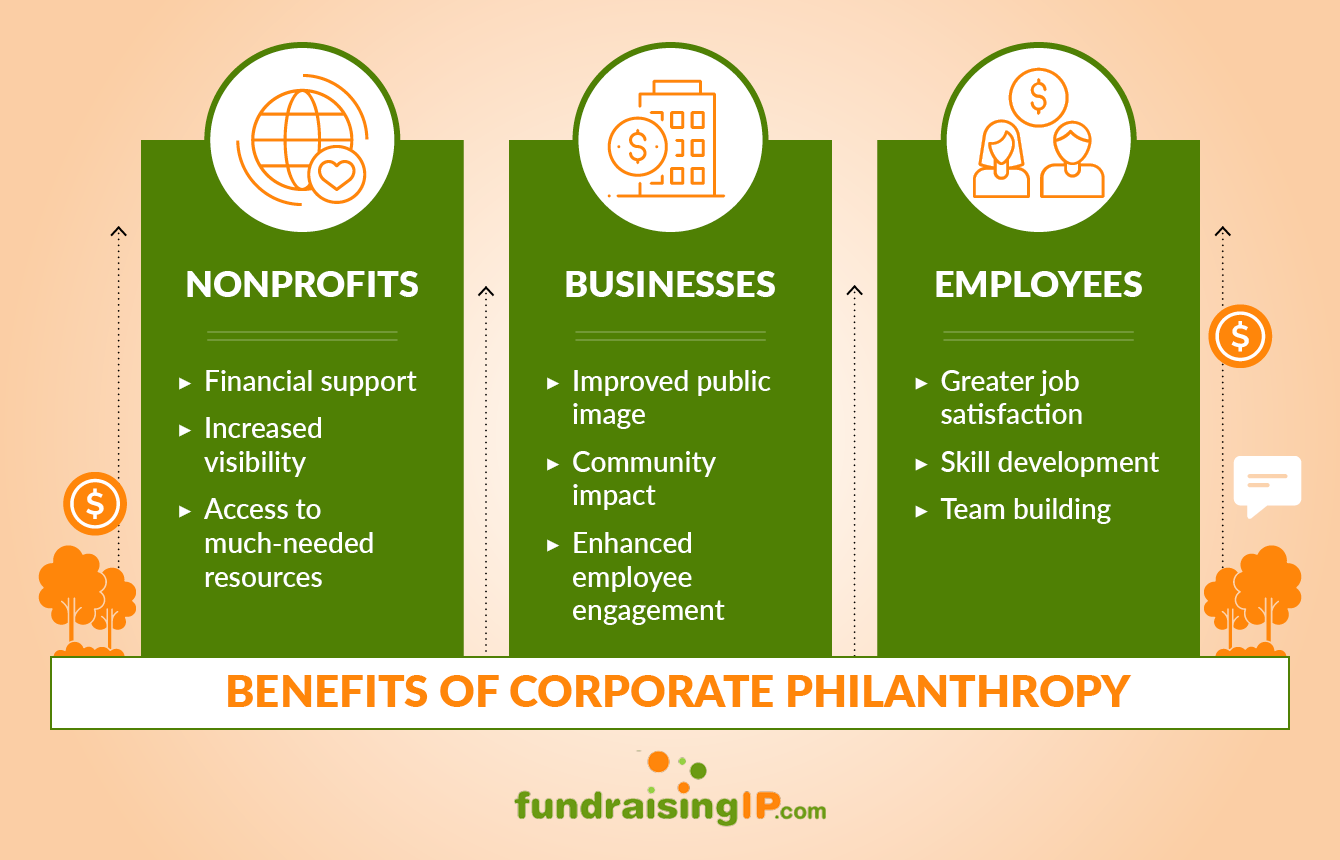The Duty of Corporate Philanthropy in Fostering Sustainable Company Practices
Business philanthropy has actually become an essential strategy for organizations aiming to incorporate sustainability right into their procedures. By aligning company objectives with social and ecological efforts, companies can cultivate healthier ecological communities. This approach not just improves corporate online reputation yet likewise strengthens stakeholder relationships. However, truth extent of its impact on long-lasting organization success continues to be to be explored. What innovative techniques are being embraced as a result?
Understanding Business Philanthropy and Its Significance
Business philanthropy acts as a vital mechanism where organizations can add to societal well-being while boosting their very own credibilities. This method includes companies allocating resources, such as funds, time, or know-how, to sustain community efforts, charitable reasons, or social programs. By participating in philanthropic efforts, companies can address pressing social issues, such as education, healthcare, and environmental issues, thus playing a crucial function in cultivating favorable change.
In addition, business philanthropy can enhance staff member spirits and draw in skill, as people increasingly seek to work for socially liable organizations. It can additionally strengthen client loyalty, as customers like brand names that show a commitment to making a difference. Ultimately, understanding the value of corporate philanthropy hinges on identifying its twin advantages: enhancing neighborhood welfare while simultaneously improving service reputation and trustworthiness in the eyes of stakeholders. This positioning of social responsibility with business passions emphasizes its value in today's company landscape.
The Connection In Between Business Philanthropy and Sustainability
While several companies participate in philanthropy to boost their public image, a deeper connection exists between corporate philanthropy and sustainability. Company philanthropy commonly lines up with sustainable methods by sustaining initiatives that address social and ecological challenges. They add to a much healthier ecological community and society when companies invest in neighborhood tasks, sustainable energy, or educational programs. This dedication not only cultivates goodwill yet additionally strengthens stakeholder connections, boosting brand name loyalty.

Situation Studies: Successful Corporate Philanthropy Initiatives
Various business have actually successfully integrated kind campaigns right into their organization approaches, demonstrating the substantial benefits of such commitments. Microsoft has actually released many programs, such as its AI for Earth effort, which sustains ecological sustainability through technology. This method not just aids preservation efforts yet also boosts Microsoft's online reputation as a leader in business responsibility.
Likewise, Unilever's Lasting Living Strategy highlights social and ecological impact, aligning its philanthropy with business purposes. By moneying jobs that boost health and cleanliness, Unilever strengthens its brand name while contributing to global health and wellness.
Another remarkable example is Patagonia, which promises 1% of sales to environmental reasons. This dedication reverberates with customers, cultivating loyalty and driving sales.
These situation researches highlight that reliable corporate philanthropy can generate financial returns while advertising sustainable techniques, reinforcing the concept that moral service practices are advantageous for both society and base lines.
Building Stronger Stakeholder Relationships Via Philanthropy
Philanthropy offers as an important tool for companies seeking to strengthen their partnerships with stakeholders, as it promotes trust and shows a commitment to social obligation. By engaging in philanthropic efforts, businesses can attach with regional neighborhoods, enhancing their credibility and encouraging stakeholder loyalty. This involvement usually brings about purposeful interactions, producing a feeling of common worths in between the business and its stakeholders.
Furthermore, kind efforts can resolve certain area requirements, permitting organizations to contribute favorably to social obstacles. This participation not just showcases a company's honest stance however additionally assists in attracting and preserving clients that prioritize social responsibility.
Furthermore, workers commonly feel a lot more inspired and engaged when they see their organization proactively joining humanitarian tasks, leading to an extra efficient workplace culture. Company philanthropy becomes a tactical method for constructing more powerful, more resistant partnerships with varied stakeholder groups.
Gauging the Influence of Business Philanthropy on Service Success
The link between company philanthropy and stakeholder engagement sets the phase for reviewing its effect on overall service success. Organizations commonly gauge this effect through numerous metrics, consisting go right here of brand name reputation, worker complete satisfaction, and customer commitment. Philanthropic campaigns can enhance a business's picture, cultivating trust fund among consumers and financiers alike. In addition, involved employees often tend to show greater morale and efficiency, straight correlating to boosted company performance.
see it here Quantitative evaluation can additionally be utilized, with organizations evaluating monetary returns versus philanthropic expenditures. Research suggests that firms with solid kind dedications often experience greater stock performance and lowered volatility. In addition, qualitative assessments, such as stakeholder comments, can give understandings right into area perceptions and long-term relational advantages.
Eventually, measuring the impact of company philanthropy requires a complex method, incorporating both qualitative and quantitative data to ensure a thorough understanding of its impact on business success. corporate philanthropy.
Frequently Asked Inquiries
How Can Local Business Involve in Company Philanthropy Successfully?
What Prevail False Impressions About Corporate Philanthropy?

How Does Company Philanthropy Impact Employee Morale?
Company philanthropy favorably influences staff member spirits by fostering a sense of function, improving job fulfillment, and promoting loyalty. Workers commonly really feel much more involved and encouraged when their company adds to social causes, producing a helpful workplace.
What Are the Tax Benefits of Corporate Philanthropy for Services?
Company philanthropy offers considerable tax advantages for organizations, including deductions on charitable payments and prospective decreases in taxable income. These incentives motivate companies to engage in social initiatives while concurrently enhancing their monetary standing.
Exactly How Can Business Choose Reliable Philanthropic Partners?
Business can choose look here effective humanitarian companions by assessing positioning with their values, evaluating impact capacity, taking a look at economic openness, and fostering solid communication. This strategic technique boosts cooperation and guarantees shared advantages for both events included.
Corporate philanthropy offers as an important system through which organizations can add to social health while enhancing their very own reputations - corporate philanthropy. Ultimately, recognizing the significance of company philanthropy lies in acknowledging its twin advantages: enriching community well-being while at the same time boosting service integrity and reliability in the eyes of stakeholders. While many companies engage in philanthropy to enhance their public image, a much deeper link exists between corporate philanthropy and sustainability. The connection between company philanthropy and stakeholder engagement sets the stage for evaluating its impact on overall organization success. Corporate philanthropy uses substantial tax advantages for services, including deductions on charitable contributions and potential reductions in taxed earnings